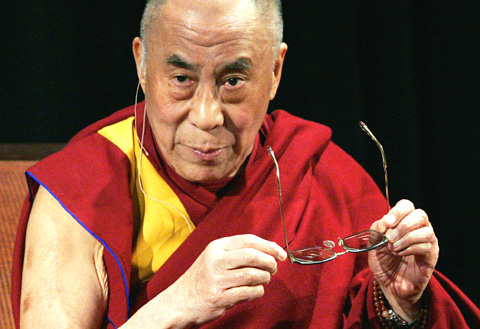¡@
|
|
| MOSAIC
MATSU
|
¡@
¡@
No more
concessions from Tibet: Dalai Lama
AP AND DPA, SEATTLE AND WASHINGTON
Tuesday, Apr 15, 2008, Page 7
¡@
 |
| The Dalai Lama
removes his eyeglasses during a news conference on Sunday in Seattle,
Washington, where he is attending the five-day ¡§Seeds of Compassion¡¨
conference. He said he feared the Chinese government would increase its
suppression of the Tibetan people.
|
¡@
The Dalai Lama said on Sunday that Tibet cannot make any more
concessions to China and renewed his calls for the government to cease
suppression in his homeland and withdraw troops.
The exiled Tibetan spiritual leader denied Chinese claims that he has called for
Tibet to be split from China and that he is behind recent turmoil, saying
instead that he is committed to pursuing Tibet¡¦s right to autonomy.
¡§The whole world knows that the Dalai Lama is not seeking independence, nor
separation,¡¨ he said at a news conference.
¡§Our struggle is with a few in the leadership of the People¡¦s Republic of China
and not with the Chinese people,¡¨ the Dalai Lama said in a statement released
after the news conference. ¡§If the present situation in Tibet continues, I am
very much concerned that the Chinese government will unleash more force and
increase the suppression of Tibetan people.¡¨
He said that if China stops such suppression and withdraw armed police and
troops, he would advise all Tibetans to stop their protests.
The Dalai Lama, visiting Seattle for the five-day Seeds of Compassion
conference, told journalists on Sunday that there have been some talks between
representatives of his government-in-exile and China.
The talks date back to 2002 and some progress was made, but by last July the
discussions had deteriorated, he said.
He said Chinese President Hu Jintao¡¦s (JÀAÀÜ) push for a ¡§harmonious society¡¨
showed the Chinese Communist Party was ¡§in a state of transformation.¡¨
He reiterated his support for the Beijing Olympics, while adding that critics of
China should be allowed to protest peacefully during the Olympic torch relay.
He also repeated his threat to step down as head of the Tibetan
government-in-exile if violence in Tibet gets out of hand.
¡§Sooner or later, the Chinese Communist Party of China must accept reality and
act according to reality¡¨ toward Tibet, he said.
He said that while he supported China¡¦s aim to become a superpower and believed
it deserved to become one, it lacked the crucial element of ¡§moral authority.¡¨
¡@
¡@
Taiwan can
provide a voice for the Tibetans
¡@
By Chow Mei-li
©P¬ü¨½
Tuesday, Apr 15, 2008, Page 8
¡¥To Buddhists, libeling monks is a great sin ¡X and criticism of the Dalai
Lama ... even more so.¡¦
Taiwan is a Han-language society that has frequent exchanges with China. Aside
from sharing a common language, Taiwan is also the Han-speaking society with the
largest concentration of Tibetan Buddhists outside China. Taiwanese Buddhists
and Tibetan monks have been closely connected for decades. This gives Taiwan the
opportunity to play a key role as an emissary of peace between Tibetans and the
Han.
First, the roots of Tibetan uprisings have often been religion-based. Tibet is a
society that centers its life and culture on religion. However, under communist
rule, the Chinese government has not only politically intervened in, but also
attempted to control, religion.
Beijing has regulations for the management of Tibetan temples, which include
compulsory ¡§patriotic education¡¨ classes. Beijing kidnapped the 11th Panchen
Lama, who was recognized by the Dalai Lama and whose whereabouts are unknown to
this day. It named another boy as the reincarnation of the Panchen Lama in order
to control Tibetan Buddhism, and thus Tibetans themselves.
This bid has not worked, but the Chinese are undeterred. Just last year, Beijing
intensified its effort to control Tibetan Buddhists by passing a regulation on
reincarnations in Tibetan Buddhism in an attempt to control the entire selection
process.
The Chinese government has forced monks to oppose the Dalai Lama in public, or
to become signatories of attacks on him. This has caused great anger among
Tibetans and Buddhists. To Buddhists, libeling monks is a great sin ¡X and
criticism of the Dalai Lama, the spiritual leader of Tibetan Buddhism, even more
so.
Many of the recent protests and peaceful demonstrations originated in temples
and were initiated by monks. As Buddhists, regardless of sect, the knowledge of
these truths would undoubtedly lead to deep empathy with the psychological and
physical torment and pain of the Tibetan monks.
We therefore urge Taiwanese Buddhists to express their compassion and support
the practice of Buddhism by all Buddhists in the forms chosen by them.
Responding to the threat that hatred between the Han and Tibetans could be
intensified by the Chinese government¡¦s actions, the Dalai Lama issued an appeal
to the Chinese people on March 28: ¡§Chinese brothers and sisters -¡X wherever you
may be ¡X with deep concern I appeal to you to help dispel the misunderstandings
between our two communities. Moreover, I appeal to you to help us find a
peaceful, lasting solution to the problem of Tibet through dialogue in the
spirit of understanding and accommodation.¡¨
This is a compassionate Dalai Lama, as a monk, praying for the planting of a
seed of harmony rather than hatred between the Han and Tibetans. We believe that
so long as the Tibetan people are not granted their freedom, Chinese will also
never have peace, as the fates of Tibetans and Han Chinese are intertwined.
Thus, Taiwanese have the responsibility to reveal the truth to the Chinese and
deliver the message of peace from the Dalai Lama and Tibetans, to prevent the
continued escalation of hatred between Chinese and Tibetans.
Chow Mei-li is president of Taiwan
Friends of Tibet.
¡@